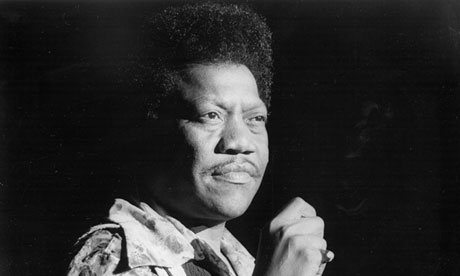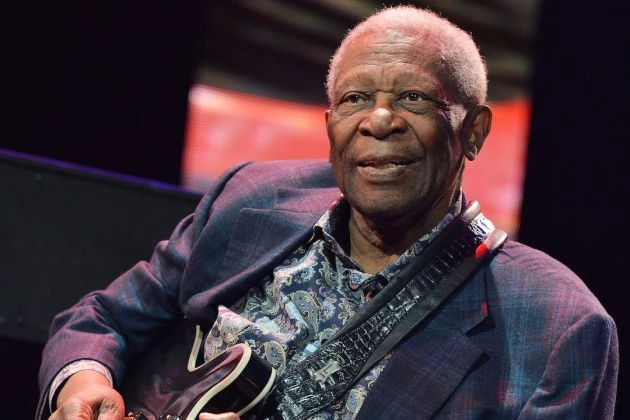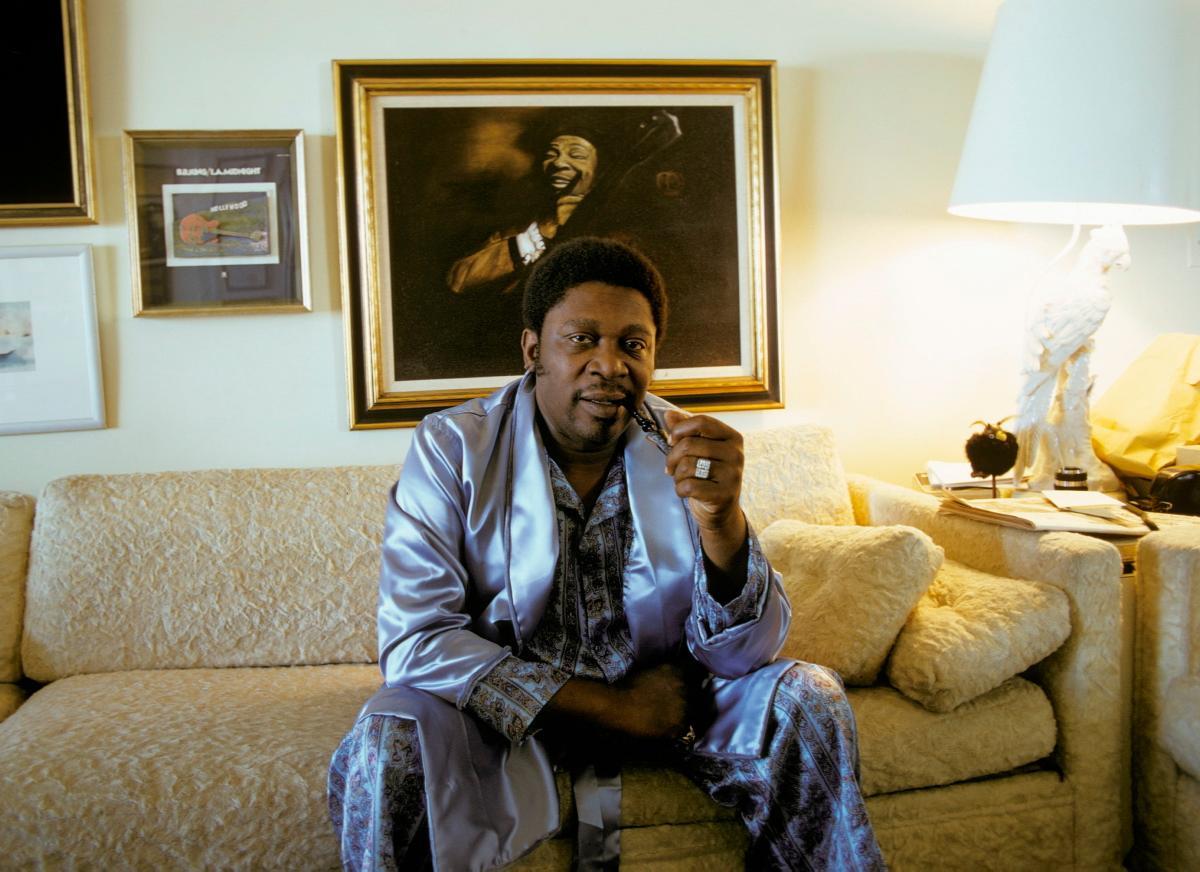Oft-imitated American music giant had global impact in a landmark career that stretched seven decades
By George Varga -
San Diego Union-Tribune
The thrill is gone for millions of music fans around the world, following the death on Thursday of B.B. King. His attorney said King died peacefully in his sleep at 9:40 p.m. PDT Thursday at his home in Las Vegas.
The iconic blues guitarist and singer was 89. He had been musically active until last fall, when he collapsed on stage during a concert in Chicago. No cause of death has been disclosed yet. But King was hospitalized in early April, when he was suffering from dehydration. He was briefly hospitalized again on April 30, according to his daughter, Patty King, who said he may have had a minor heart attack. He had also battled Type 2 diabetes for decades.
A message posted Friday, May 1, on King's website read: "I am in home hospice care at my residence in Las Vegas. Thanks to all for your well wishes and prayers."
King made his first record in 1949. He scored his first R&B chart-topper, an electrifying version of Lowell Fulson's "Three O'Clock Blues," in 1952. His star rose significantly higher in the 1960s, when the Rolling Stones, Clapton, Johnny Winter and many other blues-inspired English and American artists began singing his praises, emulating his sound and musical style, and performing and recording his songs.
"B.B. King changed my life," said Carlos Santana, who as a teenaged guitarist played songs by King in Tijuana nightclubs. "His music was liberating to me."
King and Clapton won a Grammy Award together in 2001 for their joint album, "Riding with the King." It sold more than 2 million copies in the U.S. alone and provided Clapton with an opportunity to publicly acknowledge the artistic debt he, like so many other musicians, owed to King.
"He’s like a father figure and uncle. He’s this genius artist to me," Clapton said of King in a 2007 U-T San Diego interview. "I can’t ever see myself as being in the same league with him."
Being embraced by the world of rock helped introduce King to an enormous audience of young new fans. In 1969, he performed at both the Atlantic City Pop Festival in New Jersey and the International Pop Festival in Texas, where he shared the stage with Led Zeppelin, Creedence Clearwater Revival, Santana and Janis Joplin. His popularity on other continents also grew exponentially.
From then on, he was often imitated by scores of musicians on both sides of the Atlantic, but never equaled. "Rock Me Baby," "Sweet Little Angel," "The Thrill is Gone," "Sweet 16," "How Blue Can You Get," "Let the Good Times Roll" and other classic songs in his repertoire have long been standards performed by countless other musicians.
King both defined and transcended the blues with his stinging guitar work and alternately ferocious and tender vocals. Both were so distinctive that he could be identified after playing or singing just one or two notes. His musical disciples ranged from the Rolling Stones and U2 to John Mayer and D'Angelo, all of whom recorded with him, along with countless others, from superstars to bar bands. The rollicking "When Love Comes to Town," which King recorded with U2 for the band's 1988 album, "Rattle and Hum," rose to the No. 6 spot on the Billboard singles chart.
"He's influenced everybody," fellow guitarist David Lindley said of King. "Everyone who plays electric guitar has come through him, directly or indirectly."
A 1987 Rock and Roll Hall of Fame inductee, King devoted more than 70 years of his life to the vibrant music that was long synonymous with his name. His billing as the "King of the Blues" qualified as a factual statement, not a boast. He ranks alongside Hank Williams, Miles Davis, Frank Sinatra and Billie Holiday as an American music giant whose music was both of, and beyond, its time.
King had been in failing health in recent years and had difficulty walking or standing for more than a few minutes at a time. For much of the past decade, he performed his concerts while seated, although his musical decline only became overtly apparent over the past few years.
When he performed Aug. 27 at Humphreys Concerts by the Bay, in what proved to be his final San Diego appearance, he appeared confused and sang and played erratically, struggling to find the right notes on his guitar and starting and ending his songs abruptly. Some oafish concertgoers loudly heckled him.
Less than two months later, following a series of equally disheartening shows, his performing career came to an end after he collapsed on stage during an Oct. 3 concert in Chicago. It was a sad coda to one of the most prolific and profoundly inspirational careers in American music history.
A tireless performer, in good health and bad, King toured relentlessly, playing up to 300 shows a year even after scoring a Top 15 pop radio hit in 1970 with "The Thrill is Gone." In 2005, at the age of 80, he still averaged 150 concerts a year. Last year, he performed close to 100 shows before his failing health resulted in his unofficial retirement. Ironically, his Oct. 3 collapse in Chicago came the same day that a Toyota TV commercial debuted that featured King playing Lucille, the name he gave to his legendary electric guitar.
As long as a decade ago, King acknowledged he was entering his twilight period. But vowed he would keep moving forward, and continued performing for another eight years after his 2006 "farewell" tour.
"At my age, I feel like if I don't learn something new every day, it's kind of like a day lost," King said in a 2005 U-T San Diego interview. "I think the clock is ticking, yes. In fact, I know it is. Frank Sinatra sang about `the September of (his) years'; I think I'm in the November of my years...
"I don't drink or smoke, but I like looking at the girls! I'm a diabetic, yes, but I'm pretty healthy. I'm 80 years old, yes, but I get along very well; I hardly remember I'm 80 unless I have to run up a hill or stairs. As long as people buy my records and come to my concerts, I don't see anything else I'd like to do. So I feel if I live to be 90 or more, I'll be pretty lucky. One of the great joys for me is to be able to think that people appreciate what I've done, through the way they act and their way of treating me. That makes me feel that I've been kind of productive, somewhat, and that's the richest feeling you can have."
Riley B. King was born Sept. 16, 1925, midway between the tiny Mississippi communities of Itta Bena and Indianola, As a boy he sang in a church choir and grew up picking cotton and doing farm labor. The cousin of blues pioneer Bukka White, he was a self-taught guitarist who honed his craft playing on street corners, where he realized he could make more in tips in one night than from a week of grueling farm work.
King was inspired to pick up the electric guitar at 17 after hearing T-Bone Walker's landmark recording of "Stormy Monday Blues." He subsequently teamed with seminal blues artist Sonny Boy Williamson, and made his first record in 1949. Also in 1949, he began hosting his own radio program on WDIA in Memphis, "The Sepia Swing Show," where he would often sing and play along with the records he was airing by other artists.
As he developed the razor-sharp, single-string guitar lines that would become one of his trademarks, King collaborated with such fellow future music legends as Bobby "Blue" Bland and Johnny Ace. In 1950, King was signed to a record deal by talent scout and fellow musician Ike Turner. Soon, King was recording at Memphis Recording Service, a studio operated by Sam Phillips, who would soon earn fame as the man who discovered and signed Elvis Presley.
King would go on to make more than 50 albums, including one with the Count Basie Orchestra that he counted as a personal favorite. He won 15 Grammy Awards, the most recent in 2009, and – in 1987 – received a Lifetime Achievement Grammy. Among his many other honors are a National Medal of the Arts in 1990, a Kennedy Center Honor in 1995, Sweden's Polar Music Prize in 2004, the Presidential Medal of Freedom in 2006, and honorary doctorates from Yale and other universities.
Some of his awards are on display at the B.B. King Museum and Delta Interpretive Center, which opened in 2008 near his birthplace in Mississippi. He has been the subject of numerous books, including his acclaimed 2010 autobiography, "Blues All Around Me." He is also the subject of the 2014 film documentary, "The Life of Riley," in which Clapton, Santana, Bonnie Raitt and other prominent musicians discuss how influential King has been to them and to the world of music.
One of King's best-known songs, "Sweet Little Angel," was a tart ballad with suggestive lyrics that he delivered with a nod, a wink, and palpable passion. But he was himself an angel to an array of nonprofit organizations. They included San Diego's Photocharity, which since 2001 has raised more than $2.5 million to aid homeless and abused youth. During the past decade, King helped Photocharity raise $165,000 by donating and autographing more than a dozen guitars. In 2007, he headlined a Photocharity benefit concert at San Diego State University's Open Air Theatre.
King received many rave reviews over the years. But the first internationally prominent critic to single him out for praise was Stanley Dance, who went on to pen the liner notes for the 1967 album "Blues is King." Dance, a native of England who is now deceased, later moved to San Diego. Whenever Dance attended one of his concerts here, King would warmly introduce him from the stage.
A versatile singer, King could roar like a lion one moment, then croon sweetly the next. He named his first electric guitar, a Gibson L-30 model, Lucille. King explained the origin of the guitar's name many times in concert and interviews over the years.
“One night, two guys started to fighting and one knocked down one of them (kerosene heating) containers, and it was already burning with kerosene," King told Jazz Weekly. "And, so, when it spilled onto the floor, it looked like a river of fire and everybody started to run for the front door – including B.B. King.
“But when I got on the outside, I realized then that I had left my guitar on the inside. So I went back for it. The building was a wooden building and burning rapidly. It started to collapse around me and I almost lost my life trying to save my guitar. So the next morning, we found out that these two guys that were fighting were fighting about a lady that worked in the little dance hall. We learned that her name was Lucille. So I named the guitar Lucille to remind me to never do a thing like that again!”
King soon graduated to a series of different, higher-quality Gibson guitars. In 1980, he and Gibson teamed up to produce the first official line of B.B. King Lucille signature models. But what was truly notable about King wasn't what guitar he played, but how he played it. His sustain and ability to bend notes with pinpoint accuracy set an enduring standard. So did his penchant for playing with crisp economy and his ability to express more with just a few notes than many other guitarists could with a hundred.
Just how effective that approach could be was demonstrated to fellow guitarist Stevie Ray Vaughan when he and King played together in Texas in 1985. "Sometimes you can do less by playing a lot at once, but then you don't have to play a lot all the time. Sometimes one note is all you need. B.B. King showed me that," recalled Vaughan, who died in 1990, during a 1985 U-T San Diego interview. "We were playing in Austin, and I had the pleasure of sitting in with him. He played rhythm guitar for me for four songs that I played lead on. Then he stood up and played one note, and I died. It was the best note I've heard in years!"
In a separate U-T San Diego interview the same year, King noted that he had long considered himself a singer who played guitar to accompany his vocals. "I never thought of myself as a guitarist until the 1960s, when I read what young rock superstars like Eric Clapton and John Lennon were saying about me," he said. "What they said was always positive, but it always had to do with my guitar playing, and never with my singing. That's when I started trying to see what I could do with the guitar. I had always thought of myself as a singer who plays guitar, but now I think I do one as well as the other. Which, as far as I'm concerned, is five or six on a scale of one to ten. I think I'm a guy that 'sings', musically, on the guitar, and when I'm singing orally I still hear myself playing guitar. I never do both at the same time. It seems my coordination is off so much I don't even try to do both. But I can get away with more if I'm playing guitar, because I've always had trouble with time. When I'm singing it's easier to lose the time."
King was married and divorced twice, and told interviewers he had 15 children by 15 women. He also acknowledged, with regret, that his constant focus on his career had made him an absentee father who provided for his children financially, but not often emotionally or in person. Eleven of his children are still alive; several of them failed, in an early May court bid, to wrest control of their father's affairs and care from King's manager, who has power-of-attorney for the blues legend.
Over the years, King made a number of classic live albums, including the epic "Live at the Regal." But 1971's "Live in Cook County Jail" held a special significance for King, who performed at dozens of prisons across the country, free of charge.
"A lot of people who have gotten in trouble came up the same as I did," King, who dropped out of high school after 10th grade, said in one of his U-T San Diego interviews. "Their families weren't rich and a lot of them had to go through a lot of problems to survive. And some of them made mistakes. I feel if it had not been for me having friends and guardians that helped me go straight, it's possible I might have made the same mistakes."
"They claim that music soothes the savage beast, and I guess that has had a lot to do with it in my case. Music kept me busy. It gave me reason for hope. Because if I was hungry and in need, or if I needed friends, music helped me. And it's also brought fame, and that's helped me. I play for people, and I like to make people happy and enjoy, even though I'm playing blues. I like to make blues a stimulant that helps you forget. I like to show that I love people, and I feel that people love me. So that makes me want to perform even more."








